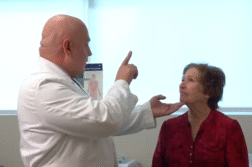SAN DIEGO, Calif. (Ivanhoe Newswire) — The National Institutes of Health estimates five and a half million Americans suffer from Alzheimer’s disease. There’s no therapeutic way to slow or prevent the disease … yet. One researcher’s remarkable discovery could lead to doctors using existing drugs to treat Alzheimer’s.
Today, Kristina Short is reading a story about Ellen DeGeneres to her mom.
Her mom, Bobbie Heldt has Alzheimer’s disease, accelerated by a bad fall six years ago.
Heldt said, “We’ve had a very nice life together and the kids are just perfect children.”
They help Heldt live her best life, but it’s been tough for her husband and six children to watch her decline.
Short said, “We’ve all had to adjust to a new person, my mom … and I still miss my old mom. It’s probably the hardest part.”
Jerold Chun, MD, PhD, Professor and Senior Vice-President at Sanford Burnham Prebys Medical Discovery Institute and his team’s research shows that the brain recombines or mis-shuffles DNA in Alzheimer’s patients, creating thousands of new gene variations.
“We believe that is the process which hasn’t been recognized before, that could give rise over time to the most common form of Alzheimer’s disease,” Dr. Chun said.
The Alzheimer’s gene, APP, is recombined by an enzyme found in HIV called reverse transcriptase. HIV patients have been taking FDA approved inhibitors to stop the virus from replicating itself for years. Dr. Chun wants to see if Alzheimer’s patients could get the same benefit.
“This mechanism could extend beyond Alzheimer’s disease and actually be relevant to a number of other types of brain disorders,” said Dr. Chun.
Dr. Chun wants to begin trials testing the drugs with Alzheimer’s patients right away.
In his research, Dr. Chun has found that virtually no HIV patients who’d been taking medications that include the reverse transcriptase inhibitors developed Alzheimer’s. He believes the HIV drugs could prevent or slow the progression of Alzheimer’s.
Contributors to this news report include: Wendy Chioji, Field Producer; Rusty Reed, Videographer; Cyndy McGrath, Supervising Producer; Hayley Hudson, Assistant Producer; Roque Correa, Editor.
To receive a free weekly e-mail on Medical Breakthroughs from Ivanhoe, sign up at: http://www.ivanhoe.com/ftk
MEDICAL BREAKTHROUGHS
RESEARCH SUMMARY
TOPIC: ALZHEIMER’S AND DNA SHUFFLING
REPORT: MB #4553
BACKGROUND: Alzheimer’s disease makes up 60-80 percent of dementia cases. It is a progressive disease causing the symptoms to get worse over time. Age is one of the risk factors, but 200,000 Americans under the age of 65 are affected by it. It is the 6th leading cause of death in the U.S. After being diagnosed with Alzheimer’s, patients usually live for four to eight years, but they can live for up to 20 years later. The beginning symptoms of Alzheimer’s are loss of memory of new information. The symptoms are more obvious to family members, but the person with the disease will not notice they have a problem.
(Source: https://www.alz.org/alzheimers-dementia/what-is-alzheimers https://medicalxpress.com/news/2018-11-hiv-drugs-alzheimer-undiscovered-root.html)
TREATMENTS: Dr. Barry Reisberg created the seven stages that someone goes through after being diagnosed with Alzheimer’s. Stage 1 is no impairment. There is no way to detect the disease, but it is developing. Stage 2 is very light decline. This means that someone might start to lose things or not remember where something is, but it is no cause for concern. Stage 3, mild decline, is where people start to forget new information. They might have trouble with organization and finding the right words. Stage 4, moderate decline, means that someone is losing their short- term memory and may start to lose longer histories such as family lines. Next is moderately severe decline, which includes confusion and difficulty dressing. Stage 6 is when someone needs constant supervision, and the final stage is when the disease becomes terminal. There are many FDA medications that can be given, such as memantime, Exelon and Aricept. For mild to moderate Alzheimer’s medicine helps with memory recovery, and for moderate to severe, the medicine helps decrease the symptoms.
(Source: https://www.alzheimers.net/stages-of-alzheimers-disease/ https://www.nia.nih.gov/health/how-alzheimers-disease-treated)
NEW TECHNOLOGY: New research suggests that an enzyme found in HIV could help Alzheimer’s. The disease rearranges genes in the neurons of the brain like the immune system does when it creates antibodies. The inhibitors could help prevent those with Down syndrome from getting the disease. The enzyme is naturally in the body, and it helps copy the genomes from normal cells into infected cells to block the process.
(Source: https://medicalxpress.com/news/2018-11-hiv-drugs-alzheimer-undiscovered-root.html)
FOR MORE INFORMATION ON THIS REPORT, PLEASE CONTACT:
Monica May
858-795-5147
If this story or any other Ivanhoe story has impacted your life or prompted you or someone you know to seek or change treatments, please let us know by contacting Marjorie Bekaert Thomas at mthomas@ivanhoe.com




